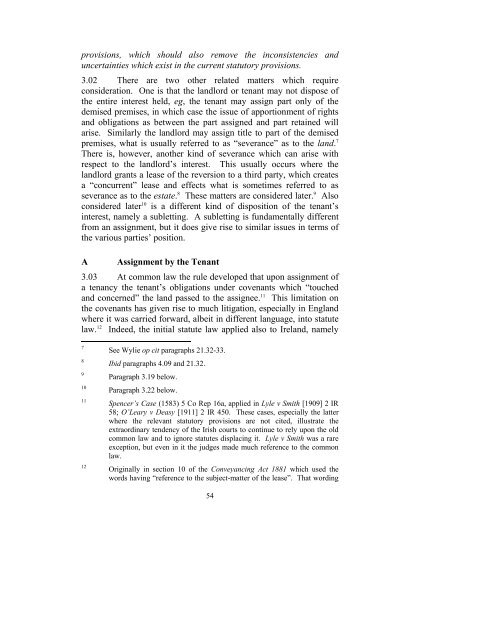Consultation Paper on the General Law of the Landlord and Tenant
Consultation Paper on the General Law of the Landlord and Tenant
Consultation Paper on the General Law of the Landlord and Tenant
You also want an ePaper? Increase the reach of your titles
YUMPU automatically turns print PDFs into web optimized ePapers that Google loves.
provisi<strong>on</strong>s, which should also remove <strong>the</strong> inc<strong>on</strong>sistencies <strong>and</strong>uncertainties which exist in <strong>the</strong> current statutory provisi<strong>on</strong>s.3.02 There are two o<strong>the</strong>r related matters which requirec<strong>on</strong>siderati<strong>on</strong>. One is that <strong>the</strong> l<strong>and</strong>lord or tenant may not dispose <strong>of</strong><strong>the</strong> entire interest held, eg, <strong>the</strong> tenant may assign part <strong>on</strong>ly <strong>of</strong> <strong>the</strong>demised premises, in which case <strong>the</strong> issue <strong>of</strong> apporti<strong>on</strong>ment <strong>of</strong> rights<strong>and</strong> obligati<strong>on</strong>s as between <strong>the</strong> part assigned <strong>and</strong> part retained willarise. Similarly <strong>the</strong> l<strong>and</strong>lord may assign title to part <strong>of</strong> <strong>the</strong> demisedpremises, what is usually referred to as “severance” as to <strong>the</strong> l<strong>and</strong>. 7There is, however, ano<strong>the</strong>r kind <strong>of</strong> severance which can arise withrespect to <strong>the</strong> l<strong>and</strong>lord’s interest. This usually occurs where <strong>the</strong>l<strong>and</strong>lord grants a lease <strong>of</strong> <strong>the</strong> reversi<strong>on</strong> to a third party, which createsa “c<strong>on</strong>current” lease <strong>and</strong> effects what is sometimes referred to asseverance as to <strong>the</strong> estate. 8 These matters are c<strong>on</strong>sidered later. 9 Alsoc<strong>on</strong>sidered later 10 is a different kind <strong>of</strong> dispositi<strong>on</strong> <strong>of</strong> <strong>the</strong> tenant’sinterest, namely a subletting. A subletting is fundamentally differentfrom an assignment, but it does give rise to similar issues in terms <strong>of</strong><strong>the</strong> various parties’ positi<strong>on</strong>.A Assignment by <strong>the</strong> <strong>Tenant</strong>3.03 At comm<strong>on</strong> law <strong>the</strong> rule developed that up<strong>on</strong> assignment <strong>of</strong>a tenancy <strong>the</strong> tenant’s obligati<strong>on</strong>s under covenants which “touched<strong>and</strong> c<strong>on</strong>cerned” <strong>the</strong> l<strong>and</strong> passed to <strong>the</strong> assignee. 11 This limitati<strong>on</strong> <strong>on</strong><strong>the</strong> covenants has given rise to much litigati<strong>on</strong>, especially in Engl<strong>and</strong>where it was carried forward, albeit in different language, into statutelaw. 12 Indeed, <strong>the</strong> initial statute law applied also to Irel<strong>and</strong>, namely789101112See Wylie op cit paragraphs 21.32-33.Ibid paragraphs 4.09 <strong>and</strong> 21.32.Paragraph 3.19 below.Paragraph 3.22 below.Spencer’s Case (1583) 5 Co Rep 16a, applied in Lyle v Smith [1909] 2 IR58; O’Leary v Deasy [1911] 2 IR 450. These cases, especially <strong>the</strong> latterwhere <strong>the</strong> relevant statutory provisi<strong>on</strong>s are not cited, illustrate <strong>the</strong>extraordinary tendency <strong>of</strong> <strong>the</strong> Irish courts to c<strong>on</strong>tinue to rely up<strong>on</strong> <strong>the</strong> oldcomm<strong>on</strong> law <strong>and</strong> to ignore statutes displacing it. Lyle v Smith was a rareexcepti<strong>on</strong>, but even in it <strong>the</strong> judges made much reference to <strong>the</strong> comm<strong>on</strong>law.Originally in secti<strong>on</strong> 10 <strong>of</strong> <strong>the</strong> C<strong>on</strong>veyancing Act 1881 which used <strong>the</strong>words having “reference to <strong>the</strong> subject-matter <strong>of</strong> <strong>the</strong> lease”. That wording54
















